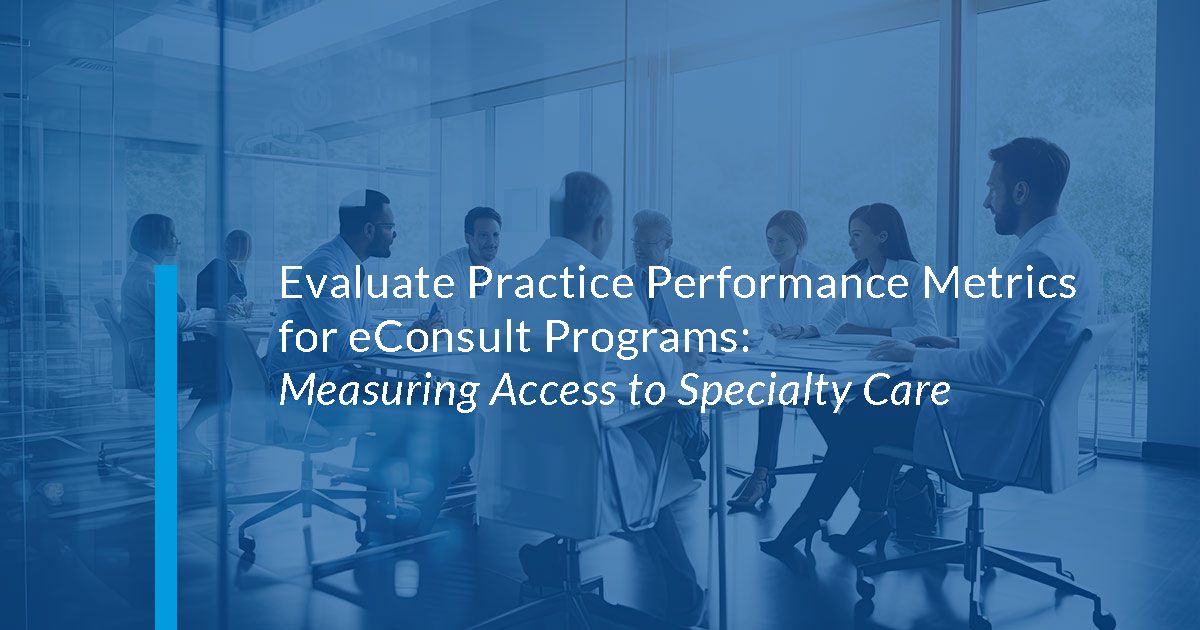
In this series, we focus on best practices for measuring the impact of eConsults on practice performance and patient care:
- Provider Adoption
- Patient Access to Specialty Care
- Clinical Quality
- Patient Benefits
- Practice Performance & Cost Savings
In this blog, we will focus on how an eConsult program increases access to specialty care and its impact on practice performance metrics.
Measuring Patient Access to Specialty Care
With considerable time and effort, at-risk practices identify patients at high risk of serious health events. We want to use this same information to develop an eConsult strategy. To increase patient access to specialty care, consider which specialties have:

Long Appointment Wait Times

Higher Costs

Conditions Easily Managed by PCPs

Do Not Need A Face-to-Face Visit
Using eConsults in these situations will drive cost savings, improve outcomes and decrease the risk of:
- ED use – a costly alternative to a specialist visit.
- Unscheduled or canceled specialty care appointments.
- Boomerang appointments to primary care.
Increasing access to specialty care is the goal. Together, we can track and communicate which specialties are most:
- Needed by the patients you serve
- Likely to improve outcomes
- Appropriate for eConsult
- Valuable to your practice
Identify Specialties with Long Appointment Wait Times
There are many reasons why patients must wait too long to get an appointment with a specialist.
- Not all specialists accept Medicare and Medicaid.
- Doctors in many specialty areas are unevenly distributed across the country.
- Patient referrals are often scheduled by the urgency of the condition.
- Current patients are prioritized for appointments.
Merritt Hawkins reports that the nationwide average wait time to see an orthopedic surgeon is relatively short – just 16.9 days. However, looking at the average can be misleading.
- This average is a 48% increase when compared to 2017
- Getting an appointment with an orthopedist varies tremendously by location – San Diego averages 55 days!
Several factors impact appointment wait times. Not all specialists accept Medicare and Medicaid. Specialists are often clustered in metropolitan areas and unevenly distributed across the county.
Patient’s are less likely to schedule and attend a specialist appointment:
- When the wait time is extended.
- Travel distance to the specialist is significant.
- Cost of the appointment is high — the patient has high-deductible insurance, or the specialist is out-of-network.
In addition, patient referrals are often prioritized by urgency or whether they are a current patient. And, scheduling an appointment with a specialist is only the first step — patients visiting a specialist average three encounters with a specialist for each condition.
Identify High-Cost Specialities
When you know your patient population, as most at-risk practices do, it’s easy to identify opportunities to deploy eConsults in high-value specialties. Let’s look at a few of the more expensive specialties and frequently occurring conditions submitted as eConsults.
Common eConsult Conditions Treated in the Primary Care Setting

CARDIOLOGY
- Abnormal EKG
- Arrhythmia
- Bradycardia
- EKG Overread
- Hypertension
- Medication Management
- Pre-operative Risk
- Stress Test Interpretation

HEMATOLOGY
- Abnormal Labs
- Anemia
- Coagulopathy
- Eosinophilia
- Leukocytosis
- Leukopenia
- Neutropenia
- Polycythemia

NEUROLOGY
- Abnormal Imaging
- Abnormal Movements or Tremors
- Cognitive Impairment or Memory
- Epilepsy or Seizure
- Headache or Head Injury
- Multiple Sclerosis
- Peripheral Neuropathy
- Vertigo or Dizziness

ORTHOPEDIC SURGERY
- Bursitis
- Elbow Pain
- Extremity Fracture
- Hip Pain
- Low Back Pain
- Neck Pain
- Patellofemoral Knee Pain
- Shoulder Pain
Identify Conditions Easily Managed in the Primary Care Setting
Match patients to the best provider in the right setting, at the right time…with the right information. If it’s not urgent, procedural or diagnostic, it likely can be managed in the primary care setting using an eConsult. eConsult specialists also support patients with chronic conditions and abnormal labs and imaging. Finally, patients with comorbidities are often good candidates for eConsults.
To diagnose and treat this patient, a PCP would need to consider referring her to as many as 3 specialties – Cardiology, Endocrinology and Psychiatry.
Given the patient’s symptoms, the time required to obtain multiple appointments, and the costs of patient access to specialty care, a better approach would be to start with an eConsult. In this case, the PCP decided to request a Cardiology eConsult, which identified the recent addition of Atenolol as the source of her symptoms
PATIENT HISTORY
A 55-year-old female was diagnosed with insulin-dependent diabetes at age 12.
- Insulin pump since she was 42
- Performs blood glucose monitoring through a Continuous Glucose Monitor (CGM)
- Suffers from depression
- Treated with a daily dose of 50 mg of Zoloft
- Recent Atrial fibrillation (A-fib) diagnosis
- Prescribed Atenolol 25 mg twice daily
PATIENT SYMPTOMS
- Increasing symptoms of lethargy and depression
- Sad
- Unmotivated
- Recent struggle to keep her blood glucose under 140
- No change in diet or exercise
Avoiding Unnecessary Specialty Visits
The efficacy of your eConsult program can be measured by the number of replaced visits. 79% is a good replaced visit rate. Across all eConsults, we average over 74% of replaced visits. This statistic is affected by the whether a relevant clinical details and a specific clinical question. Without this information you’ll see few replaced visits. AristaMD offers two tools to help including a work-up checklist is displayed for most conditions, which tells you what the specialist will need to return a high-quality response.
We also offer a Referral Navigations Nurses. This services leverages registered nurses to curate the eConsult for the PCP. Our nurses have extensive experience, and the eConsults they prepare have a much higher replaced visit rate.
The characteristics of the condition also impact the replaced visit rate. In the eConsult response, the AristaMD specialist can indicate that:
- A different specialty is needed.
- A new or different diagnosis.
While these response does not always mean a face-to-face visit will be recommended, help the PCP obtain advice from the appropriate specialty by eConsult or reveal an emergent condition.
Each avoided visit saves the risk holder between $500-$1000 per avoided referral, including a 10% reduction in the number of visits per referral.
